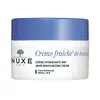What's inside
What's inside
 Key Ingredients
Key Ingredients

 Benefits
Benefits

 Concerns
Concerns

 Ingredients Side-by-side
Ingredients Side-by-side

Water
Skin ConditioningDicaprylyl Carbonate
EmollientGlycerin
HumectantNiacinamide
SmoothingPropanediol
SolventBetaine
HumectantPolyglyceryl-4 Isostearate
EmulsifyingCoco-Caprylate/Caprate
EmollientMagnesium Sulfate
Glycosphingolipids
EmollientGlycolipids
Skin ConditioningSodium Benzoate
MaskingDisteardimonium Hectorite
StabilisingOleic Acid
EmollientPotassium Sorbate
PreservativeCitric Acid
BufferingPolyglycerin-3
HumectantWater
Skin ConditioningGlycerin
HumectantCaprylic/Capric Triglyceride
MaskingDicaprylyl Ether
EmollientButyrospermum Parkii Butter
Skin ConditioningCetearyl Alcohol
EmollientMacadamia Integrifolia Seed Oil
Skin ConditioningParfum
MaskingXylitylglucoside
HumectantGlyceryl Stearate Citrate
EmollientBehenyl Alcohol
EmollientDimethicone
EmollientLauryl Laurate
Skin ConditioningSilica
AbrasiveAnhydroxylitol
HumectantTocopherol
AntioxidantPolyglyceryl-3 Stearate
EmulsifyingPhenoxyethanol
PreservativeXylitol
HumectantEthylhexylglycerin
Skin ConditioningHydrogenated Lecithin
EmulsifyingSodium Acrylates Copolymer
Sodium Stearoyl Glutamate
CleansingDehydroacetic Acid
PreservativeAllantoin
Skin ConditioningSodium Gluconate
Skin ConditioningLecithin
EmollientHelianthus Annuus Seed Oil
EmollientCitric Acid
BufferingSodium Carrageenan
Emulsion StabilisingSclerotium Gum
Emulsion StabilisingGlycine Soja Oil
EmollientCamellia Oleifera Seed Oil
Skin ConditioningCapryloyl Glycine
CleansingCitrus Aurantium Dulcis Flower Extract
Skin ConditioningPrunus Amygdalus Dulcis Flower Extract
HumectantCocos Nucifera Oil
MaskingPrunus Amygdalus Dulcis Oil
Skin ConditioningGlycine Soja Seed Extract
Skin ConditioningPisum Sativum Extract
Skin ConditioningDisodium EDTA
Avena Sativa Kernel Extract
AbrasiveMaris Sal
Skin ConditioningCamellia Sinensis Leaf Extract
AntimicrobialPrunus Amygdalus Dulcis Fruit Extract
Skin ConditioningRobinia Pseudoacacia Flower Extract
Skin ConditioningCocos Nucifera Fruit Extract
EmollientLinalool
PerfumingGeraniol
PerfumingLimonene
PerfumingWater, Glycerin, Caprylic/Capric Triglyceride, Dicaprylyl Ether, Butyrospermum Parkii Butter, Cetearyl Alcohol, Macadamia Integrifolia Seed Oil, Parfum, Xylitylglucoside, Glyceryl Stearate Citrate, Behenyl Alcohol, Dimethicone, Lauryl Laurate, Silica, Anhydroxylitol, Tocopherol, Polyglyceryl-3 Stearate, Phenoxyethanol, Xylitol, Ethylhexylglycerin, Hydrogenated Lecithin, Sodium Acrylates Copolymer, Sodium Stearoyl Glutamate, Dehydroacetic Acid, Allantoin, Sodium Gluconate, Lecithin, Helianthus Annuus Seed Oil, Citric Acid, Sodium Carrageenan, Sclerotium Gum, Glycine Soja Oil, Camellia Oleifera Seed Oil, Capryloyl Glycine, Citrus Aurantium Dulcis Flower Extract, Prunus Amygdalus Dulcis Flower Extract, Cocos Nucifera Oil, Prunus Amygdalus Dulcis Oil, Glycine Soja Seed Extract, Pisum Sativum Extract, Disodium EDTA, Avena Sativa Kernel Extract, Maris Sal, Camellia Sinensis Leaf Extract, Prunus Amygdalus Dulcis Fruit Extract, Robinia Pseudoacacia Flower Extract, Cocos Nucifera Fruit Extract, Linalool, Geraniol, Limonene
 Reviews
Reviews

Ingredients Explained
These ingredients are found in both products.
Ingredients higher up in an ingredient list are typically present in a larger amount.
Citric Acid is an alpha hydroxy acid (AHA) naturally found in citrus fruits like oranges, lemons, and limes.
Like other AHAs, citric acid can exfoliate skin by breaking down the bonds that hold dead skin cells together. This helps reveal smoother and brighter skin underneath.
However, this exfoliating effect only happens at high concentrations (20%) which can be hard to find in cosmetic products.
Due to this, citric acid is usually included in small amounts as a pH adjuster. This helps keep products slightly more acidic and compatible with skin's natural pH.
In skincare formulas, citric acid can:
While it can provide some skin benefits, research shows lactic acid and glycolic acid are generally more effective and less irritating exfoliants.
Most citric acid used in skincare today is made by fermenting sugars (usually from molasses). This synthetic version is identical to the natural citrus form but easier to stabilize and use in formulations.
Read more about some other popular AHA's here:
Learn more about Citric AcidGlycerin is already naturally found in your skin. It helps moisturize and protect your skin.
A study from 2016 found glycerin to be more effective as a humectant than AHAs and hyaluronic acid.
As a humectant, it helps the skin stay hydrated by pulling moisture to your skin. The low molecular weight of glycerin allows it to pull moisture into the deeper layers of your skin.
Hydrated skin improves your skin barrier; Your skin barrier helps protect against irritants and bacteria.
Glycerin has also been found to have antimicrobial and antiviral properties. Due to these properties, glycerin is often used in wound and burn treatments.
In cosmetics, glycerin is usually derived from plants such as soybean or palm. However, it can also be sourced from animals, such as tallow or animal fat.
This ingredient is organic, colorless, odorless, and non-toxic.
Glycerin is the name for this ingredient in American English. British English uses Glycerol/Glycerine.
Learn more about GlycerinWater. It's the most common cosmetic ingredient of all. You'll usually see it at the top of ingredient lists, meaning that it makes up the largest part of the product.
So why is it so popular? Water most often acts as a solvent - this means that it helps dissolve other ingredients into the formulation.
You'll also recognize water as that liquid we all need to stay alive. If you see this, drink a glass of water. Stay hydrated!
Learn more about Water